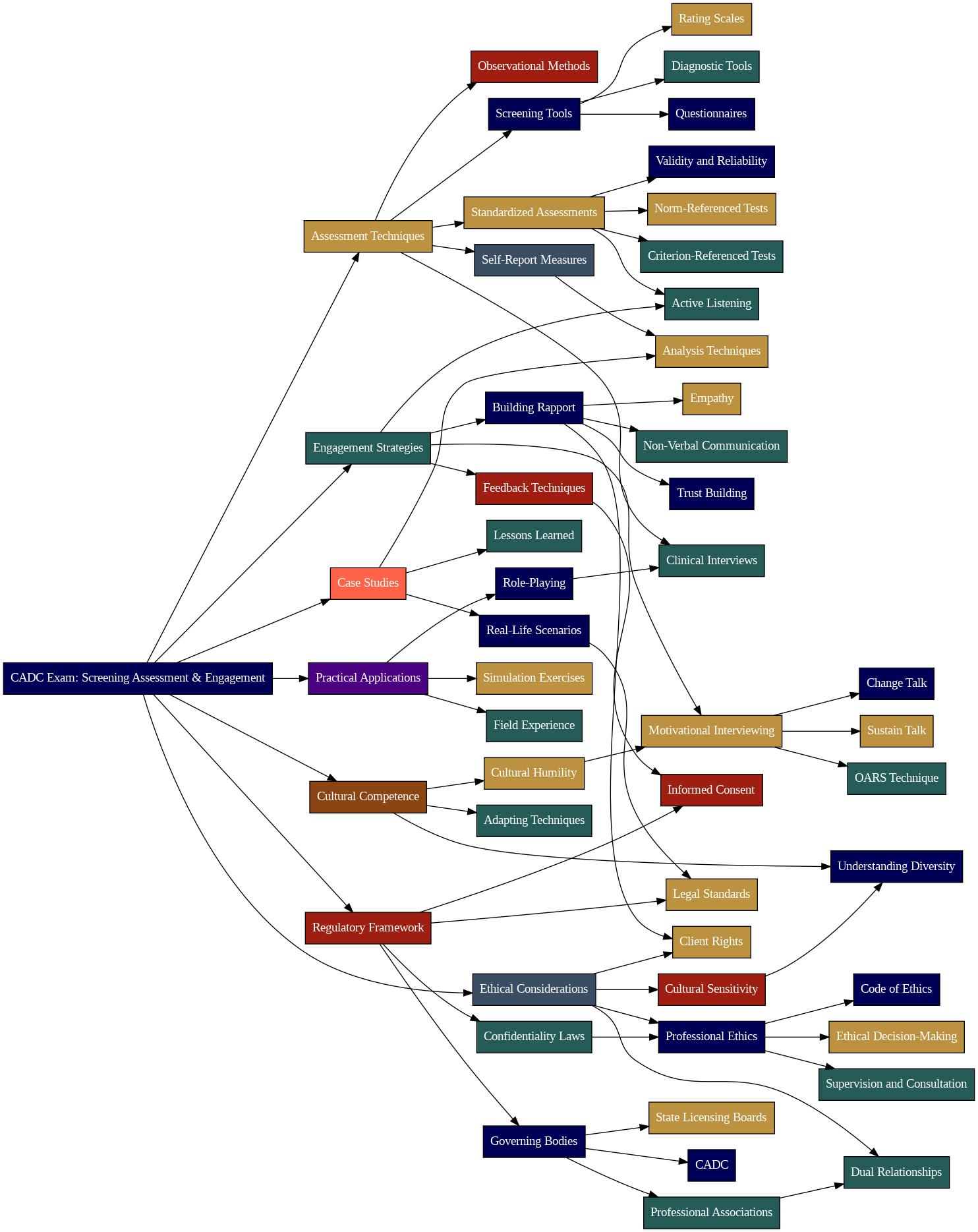Quiz-summary
0 of 30 questions completed
Questions:
- 1
- 2
- 3
- 4
- 5
- 6
- 7
- 8
- 9
- 10
- 11
- 12
- 13
- 14
- 15
- 16
- 17
- 18
- 19
- 20
- 21
- 22
- 23
- 24
- 25
- 26
- 27
- 28
- 29
- 30
Information
Premium Practice Questions
You have already completed the quiz before. Hence you can not start it again.
Quiz is loading...
You must sign in or sign up to start the quiz.
You have to finish following quiz, to start this quiz:
Results
0 of 30 questions answered correctly
Your time:
Time has elapsed
Categories
- Not categorized 0%
- 1
- 2
- 3
- 4
- 5
- 6
- 7
- 8
- 9
- 10
- 11
- 12
- 13
- 14
- 15
- 16
- 17
- 18
- 19
- 20
- 21
- 22
- 23
- 24
- 25
- 26
- 27
- 28
- 29
- 30
- Answered
- Review
-
Question 1 of 30
1. Question
Under the Health Insurance Portability and Accountability Act (HIPAA), which is applicable in Florida, what fundamental right does a client have regarding their Protected Health Information (PHI) held by a substance abuse treatment facility?
Correct
The Health Insurance Portability and Accountability Act (HIPAA) applies nationwide, including in Florida. HIPAA’s Privacy Rule establishes national standards for the protection of individually identifiable health information. Under HIPAA, clients have the right to access their protected health information (PHI), request amendments to their PHI, and receive an accounting of disclosures of their PHI. Covered entities, including addiction treatment providers, must provide clients with a Notice of Privacy Practices that explains these rights. Clients must also provide written authorization before their PHI can be disclosed for purposes other than treatment, payment, or healthcare operations. HIPAA also includes security rules to protect electronic PHI. It’s important to note that Florida has its own state laws regarding patient privacy, which may provide additional protections beyond HIPAA.
Incorrect
The Health Insurance Portability and Accountability Act (HIPAA) applies nationwide, including in Florida. HIPAA’s Privacy Rule establishes national standards for the protection of individually identifiable health information. Under HIPAA, clients have the right to access their protected health information (PHI), request amendments to their PHI, and receive an accounting of disclosures of their PHI. Covered entities, including addiction treatment providers, must provide clients with a Notice of Privacy Practices that explains these rights. Clients must also provide written authorization before their PHI can be disclosed for purposes other than treatment, payment, or healthcare operations. HIPAA also includes security rules to protect electronic PHI. It’s important to note that Florida has its own state laws regarding patient privacy, which may provide additional protections beyond HIPAA.
-
Question 2 of 30
2. Question
A client, struggling with long-term sobriety in Florida, presents their counselor with a gift card to a local coffee shop as a thank you for their support. What is the MOST ETHICALLY appropriate response for the counselor?
Correct
This question assesses the understanding of professional boundaries in addiction counseling, specifically concerning the acceptance of gifts from clients. While small tokens of appreciation might seem harmless, accepting gifts can blur the lines of the therapeutic relationship, potentially leading to boundary violations and compromised objectivity. The power dynamic inherent in the counselor-client relationship makes it particularly important to maintain clear boundaries. The question requires the candidate to evaluate the ethical implications of accepting a gift, considering factors such as the value of the gift, the client’s motivation, and the potential impact on the therapeutic relationship. The correct response will reflect an understanding of the importance of maintaining professional boundaries and avoiding situations that could exploit the client or compromise the counselor’s objectivity.
Incorrect
This question assesses the understanding of professional boundaries in addiction counseling, specifically concerning the acceptance of gifts from clients. While small tokens of appreciation might seem harmless, accepting gifts can blur the lines of the therapeutic relationship, potentially leading to boundary violations and compromised objectivity. The power dynamic inherent in the counselor-client relationship makes it particularly important to maintain clear boundaries. The question requires the candidate to evaluate the ethical implications of accepting a gift, considering factors such as the value of the gift, the client’s motivation, and the potential impact on the therapeutic relationship. The correct response will reflect an understanding of the importance of maintaining professional boundaries and avoiding situations that could exploit the client or compromise the counselor’s objectivity.
-
Question 3 of 30
3. Question
A licensed CAP in Florida, Dr. Ramirez, is treating a client, Javier, for opioid use disorder. Javier discloses during a session that he plans to seriously harm his former business partner, whom he blames for his financial ruin and subsequent substance use. Dr. Ramirez assesses Javier’s credibility and determines the threat is serious and imminent. According to Florida statutes, ethical guidelines, and legal precedents regarding duty to warn, what is Dr. Ramirez’s MOST appropriate course of action?
Correct
Florida Statute 397.501 outlines the requirements for client records in substance abuse treatment facilities. This statute emphasizes the need for confidentiality, accuracy, and completeness of records. It dictates what information must be included, such as client identifying information, assessment results, treatment plans, progress notes, and discharge summaries. The statute also specifies the conditions under which records can be accessed or released, aligning with HIPAA regulations but with additional state-specific provisions. Florida Administrative Code 65D-30 further details the standards for managing client records, including storage, security, and retention policies. These regulations ensure that client information is protected and that treatment providers adhere to professional and ethical standards. Duty to warn, as established in case law like Tarasoff v. Regents of the University of California, creates an exception to confidentiality when a client poses a serious threat of harm to a reasonably identifiable victim. In such cases, the provider has a duty to take reasonable steps to protect the intended victim, which may include warning the victim, notifying law enforcement, or taking other appropriate actions. The ethical decision-making model helps navigate complex ethical dilemmas. It involves identifying the problem, reviewing relevant ethical guidelines and laws, considering the potential consequences of different actions, consulting with supervisors or colleagues, and documenting the decision-making process. This systematic approach ensures that decisions are made in a thoughtful and ethical manner, protecting both the client and the provider.
Incorrect
Florida Statute 397.501 outlines the requirements for client records in substance abuse treatment facilities. This statute emphasizes the need for confidentiality, accuracy, and completeness of records. It dictates what information must be included, such as client identifying information, assessment results, treatment plans, progress notes, and discharge summaries. The statute also specifies the conditions under which records can be accessed or released, aligning with HIPAA regulations but with additional state-specific provisions. Florida Administrative Code 65D-30 further details the standards for managing client records, including storage, security, and retention policies. These regulations ensure that client information is protected and that treatment providers adhere to professional and ethical standards. Duty to warn, as established in case law like Tarasoff v. Regents of the University of California, creates an exception to confidentiality when a client poses a serious threat of harm to a reasonably identifiable victim. In such cases, the provider has a duty to take reasonable steps to protect the intended victim, which may include warning the victim, notifying law enforcement, or taking other appropriate actions. The ethical decision-making model helps navigate complex ethical dilemmas. It involves identifying the problem, reviewing relevant ethical guidelines and laws, considering the potential consequences of different actions, consulting with supervisors or colleagues, and documenting the decision-making process. This systematic approach ensures that decisions are made in a thoughtful and ethical manner, protecting both the client and the provider.
-
Question 4 of 30
4. Question
Javier, a client in long-term recovery from alcohol use disorder, has maintained sobriety for five years. Aisha, his former CAP counselor in Florida, is discussing his successful recovery journey with him. Which of the following factors would be considered an example of Javier’s “recovery capital”?
Correct
The concept of “recovery capital” refers to the resources available to an individual to support their recovery from substance use disorders. These resources can be internal (e.g., coping skills, motivation, self-esteem) or external (e.g., social support, financial stability, housing). Building recovery capital is a key component of long-term recovery maintenance. Individuals with higher levels of recovery capital are more likely to achieve and sustain sobriety. Interventions aimed at increasing recovery capital may include connecting clients with community resources, providing skills training, and fostering supportive relationships. Assessing a client’s recovery capital can help identify strengths and areas where additional support is needed. The concept recognizes that recovery is not solely an individual endeavor but is also influenced by the individual’s environment and access to resources.
Incorrect
The concept of “recovery capital” refers to the resources available to an individual to support their recovery from substance use disorders. These resources can be internal (e.g., coping skills, motivation, self-esteem) or external (e.g., social support, financial stability, housing). Building recovery capital is a key component of long-term recovery maintenance. Individuals with higher levels of recovery capital are more likely to achieve and sustain sobriety. Interventions aimed at increasing recovery capital may include connecting clients with community resources, providing skills training, and fostering supportive relationships. Assessing a client’s recovery capital can help identify strengths and areas where additional support is needed. The concept recognizes that recovery is not solely an individual endeavor but is also influenced by the individual’s environment and access to resources.
-
Question 5 of 30
5. Question
A client in Florida, during a therapy session with a CAP, discloses a detailed plan to inflict serious harm on their former partner. The client has a history of violence and possesses the means to carry out the threat. According to Florida Statutes and ethical guidelines for addiction professionals, what is the MOST appropriate course of action for the therapist?
Correct
Florida Statute 397.501(7) outlines specific conditions under which a substance abuse service provider may disclose confidential client information without the client’s consent. This includes situations where a client presents an imminent threat to themselves or others. The statute mandates that the disclosure be limited to information necessary to protect the client or others, and that reasonable attempts be made to notify the client of the disclosure. In the scenario, the therapist, recognizing the immediate danger posed by the client’s expressed intent to harm their former partner, has a duty to warn and protect. This duty overrides the general principle of confidentiality. The appropriate course of action involves notifying the potential victim and relevant law enforcement authorities. Failure to do so could result in legal and ethical repercussions for the therapist. The therapist must document the rationale for the disclosure, the information disclosed, and the attempts made to notify the client. Consultation with a supervisor or legal counsel is advisable to ensure compliance with all applicable laws and ethical guidelines. It’s crucial to understand the balance between client confidentiality and the duty to protect, especially within the specific legal framework of Florida.
Incorrect
Florida Statute 397.501(7) outlines specific conditions under which a substance abuse service provider may disclose confidential client information without the client’s consent. This includes situations where a client presents an imminent threat to themselves or others. The statute mandates that the disclosure be limited to information necessary to protect the client or others, and that reasonable attempts be made to notify the client of the disclosure. In the scenario, the therapist, recognizing the immediate danger posed by the client’s expressed intent to harm their former partner, has a duty to warn and protect. This duty overrides the general principle of confidentiality. The appropriate course of action involves notifying the potential victim and relevant law enforcement authorities. Failure to do so could result in legal and ethical repercussions for the therapist. The therapist must document the rationale for the disclosure, the information disclosed, and the attempts made to notify the client. Consultation with a supervisor or legal counsel is advisable to ensure compliance with all applicable laws and ethical guidelines. It’s crucial to understand the balance between client confidentiality and the duty to protect, especially within the specific legal framework of Florida.
-
Question 6 of 30
6. Question
A Florida CAP, Marcus, is working with a client, Sarah, who has been denied coverage for residential treatment by her insurance company. Sarah meets the criteria for residential treatment based on a comprehensive assessment. What is Marcus’s MOST appropriate ethical and professional responsibility in this situation?
Correct
Florida’s laws and ethical principles governing Certified Addiction Professionals (CAPs) place a strong emphasis on client rights and advocacy. Clients have the right to receive respectful and dignified treatment, to be informed about their treatment options, to participate in treatment planning, to access their records, and to file grievances. CAPs have a responsibility to advocate for their clients’ needs and to ensure that they have access to appropriate services. This may involve assisting clients with navigating the healthcare system, appealing insurance denials, or connecting them with community resources. Advocacy also extends to promoting policies and practices that support recovery and reduce stigma. CAPs must be knowledgeable about relevant laws and regulations that protect client rights. They should also be aware of the resources available to assist clients in exercising their rights.
Incorrect
Florida’s laws and ethical principles governing Certified Addiction Professionals (CAPs) place a strong emphasis on client rights and advocacy. Clients have the right to receive respectful and dignified treatment, to be informed about their treatment options, to participate in treatment planning, to access their records, and to file grievances. CAPs have a responsibility to advocate for their clients’ needs and to ensure that they have access to appropriate services. This may involve assisting clients with navigating the healthcare system, appealing insurance denials, or connecting them with community resources. Advocacy also extends to promoting policies and practices that support recovery and reduce stigma. CAPs must be knowledgeable about relevant laws and regulations that protect client rights. They should also be aware of the resources available to assist clients in exercising their rights.
-
Question 7 of 30
7. Question
A Certified Addiction Professional (CAP) in Florida is treating Maria, who is mandated to treatment following a DUI. Maria discloses occasional cocaine use (not related to the DUI incident) and requests the CAP not to disclose this information to the referring court. Which of the following actions BEST reflects an ethical approach for the CAP in this situation, considering Florida statutes and ethical guidelines?
Correct
In Florida, a Certified Addiction Professional (CAP) encounters a complex ethical situation involving a client, Maria, who is mandated to treatment following a DUI. During a session, Maria discloses that she occasionally uses cocaine when she is feeling stressed from her job, but that she has not used it since the DUI incident. Maria asks the CAP not to disclose this information to the referring entity (the court), as it could jeopardize her standing in the DUI program, even though the cocaine use is not directly related to the DUI offense. The CAP must navigate the ethical considerations of confidentiality, duty to warn (if applicable), and the requirements of mandated treatment. Florida Statute 397.501 outlines the confidentiality regulations for substance abuse treatment records. While it generally protects client confidentiality, exceptions exist for mandated treatment and legal obligations. The CAP must balance Maria’s right to privacy with the potential consequences of withholding information relevant to her substance use. Florida Administrative Code 65D-30.004 addresses the ethical standards for addiction professionals, emphasizing the importance of informed consent, client welfare, and adherence to legal requirements. The CAP needs to review the informed consent Maria signed at the beginning of treatment, which should outline the limits of confidentiality in mandated treatment scenarios. If Maria’s cocaine use presents an imminent risk of harm to herself or others, the duty to warn may be triggered. However, since Maria states she hasn’t used cocaine since the DUI, and the current use is not directly related to the DUI incident, the duty to warn may not be immediately applicable. However, the CAP must assess the potential for relapse and the impact of cocaine use on Maria’s overall well-being and compliance with the DUI program. The most ethical course of action involves a collaborative approach. The CAP should engage Maria in a discussion about the potential consequences of withholding information from the referring entity, as well as the benefits of transparency and honesty in her treatment. The CAP should also explore Maria’s reasons for using cocaine and develop coping strategies to manage stress without resorting to substance use. Ultimately, the decision of whether or not to disclose the information rests on a careful evaluation of the ethical principles involved, the legal requirements, and Maria’s best interests. The CAP should document the decision-making process and the rationale behind the chosen course of action.
Incorrect
In Florida, a Certified Addiction Professional (CAP) encounters a complex ethical situation involving a client, Maria, who is mandated to treatment following a DUI. During a session, Maria discloses that she occasionally uses cocaine when she is feeling stressed from her job, but that she has not used it since the DUI incident. Maria asks the CAP not to disclose this information to the referring entity (the court), as it could jeopardize her standing in the DUI program, even though the cocaine use is not directly related to the DUI offense. The CAP must navigate the ethical considerations of confidentiality, duty to warn (if applicable), and the requirements of mandated treatment. Florida Statute 397.501 outlines the confidentiality regulations for substance abuse treatment records. While it generally protects client confidentiality, exceptions exist for mandated treatment and legal obligations. The CAP must balance Maria’s right to privacy with the potential consequences of withholding information relevant to her substance use. Florida Administrative Code 65D-30.004 addresses the ethical standards for addiction professionals, emphasizing the importance of informed consent, client welfare, and adherence to legal requirements. The CAP needs to review the informed consent Maria signed at the beginning of treatment, which should outline the limits of confidentiality in mandated treatment scenarios. If Maria’s cocaine use presents an imminent risk of harm to herself or others, the duty to warn may be triggered. However, since Maria states she hasn’t used cocaine since the DUI, and the current use is not directly related to the DUI incident, the duty to warn may not be immediately applicable. However, the CAP must assess the potential for relapse and the impact of cocaine use on Maria’s overall well-being and compliance with the DUI program. The most ethical course of action involves a collaborative approach. The CAP should engage Maria in a discussion about the potential consequences of withholding information from the referring entity, as well as the benefits of transparency and honesty in her treatment. The CAP should also explore Maria’s reasons for using cocaine and develop coping strategies to manage stress without resorting to substance use. Ultimately, the decision of whether or not to disclose the information rests on a careful evaluation of the ethical principles involved, the legal requirements, and Maria’s best interests. The CAP should document the decision-making process and the rationale behind the chosen course of action.
-
Question 8 of 30
8. Question
During a session, a Florida CAP, observes that her client, Sarah, who has a history of both opioid use disorder and bipolar disorder, is experiencing a severe manic episode. Sarah is expressing delusional thoughts, refusing to take her medication, and making threats of self-harm. The CAP believes Sarah meets the criteria for involuntary examination under Florida’s Baker Act. What is the CAP’s MOST appropriate course of action?
Correct
Florida’s Baker Act (Chapter 394, Part I, Florida Statutes) allows for the involuntary examination of individuals who may be mentally ill and pose a danger to themselves or others. While the Baker Act primarily concerns mental health, it can be relevant in addiction treatment settings when co-occurring mental health conditions exist. A CAP cannot directly initiate a Baker Act, but they can provide information and support to other qualified professionals (e.g., physicians, licensed mental health professionals) who can initiate the process. The criteria for Baker Acting someone include: (1) the person is mentally ill, (2) the person is a danger to self or others, or is self-neglectful, and (3) the person is likely to suffer from neglect or refuse to care for themselves, and (4) without care or treatment, the person will likely suffer or continue to suffer severe emotional distress. The CAP’s role is to accurately assess the client’s condition, document their observations, and communicate their concerns to the appropriate authorities.
Incorrect
Florida’s Baker Act (Chapter 394, Part I, Florida Statutes) allows for the involuntary examination of individuals who may be mentally ill and pose a danger to themselves or others. While the Baker Act primarily concerns mental health, it can be relevant in addiction treatment settings when co-occurring mental health conditions exist. A CAP cannot directly initiate a Baker Act, but they can provide information and support to other qualified professionals (e.g., physicians, licensed mental health professionals) who can initiate the process. The criteria for Baker Acting someone include: (1) the person is mentally ill, (2) the person is a danger to self or others, or is self-neglectful, and (3) the person is likely to suffer from neglect or refuse to care for themselves, and (4) without care or treatment, the person will likely suffer or continue to suffer severe emotional distress. The CAP’s role is to accurately assess the client’s condition, document their observations, and communicate their concerns to the appropriate authorities.
-
Question 9 of 30
9. Question
A client, Maria, receiving substance abuse treatment at a Florida-based outpatient facility, discloses to her counselor that she intends to physically harm her estranged husband, providing specific details about her plan. According to Florida statutes and ethical guidelines for Certified Addiction Professionals (CAPs), what is the MOST appropriate initial course of action for the counselor?
Correct
Florida Statute 397.501 outlines specific confidentiality requirements for substance abuse records. This statute emphasizes that these records are confidential and privileged, safeguarding the privacy of individuals seeking treatment. Disclosure is generally prohibited unless specific exceptions apply, such as obtaining proper written consent from the client, a court order, or in situations where there is a duty to warn or protect. The duty to warn and protect arises when a client poses a credible and imminent threat to harm themselves or others. In such cases, the counselor has a legal and ethical obligation to take reasonable steps to prevent the harm, which may include disclosing confidential information to potential victims or law enforcement. Florida Administrative Code 65D-30.009 addresses client rights, including the right to confidentiality and informed consent. It mandates that clients must be informed of their rights and responsibilities, including the limits of confidentiality, at the outset of treatment. This ensures that clients are fully aware of the circumstances under which their information may be disclosed. Ethical decision-making models, such as the one proposed by Corey, Corey, and Callanan, provide a structured approach to resolving ethical dilemmas. These models typically involve identifying the problem, reviewing relevant ethical codes and laws, considering potential courses of action, evaluating the consequences of each action, consulting with supervisors or colleagues, and implementing the chosen course of action. When faced with a situation involving potential harm to others, counselors must carefully weigh the competing ethical principles of confidentiality and the duty to protect. This requires a thorough assessment of the client’s risk of harm, consultation with supervisors or legal counsel, and documentation of the decision-making process.
Incorrect
Florida Statute 397.501 outlines specific confidentiality requirements for substance abuse records. This statute emphasizes that these records are confidential and privileged, safeguarding the privacy of individuals seeking treatment. Disclosure is generally prohibited unless specific exceptions apply, such as obtaining proper written consent from the client, a court order, or in situations where there is a duty to warn or protect. The duty to warn and protect arises when a client poses a credible and imminent threat to harm themselves or others. In such cases, the counselor has a legal and ethical obligation to take reasonable steps to prevent the harm, which may include disclosing confidential information to potential victims or law enforcement. Florida Administrative Code 65D-30.009 addresses client rights, including the right to confidentiality and informed consent. It mandates that clients must be informed of their rights and responsibilities, including the limits of confidentiality, at the outset of treatment. This ensures that clients are fully aware of the circumstances under which their information may be disclosed. Ethical decision-making models, such as the one proposed by Corey, Corey, and Callanan, provide a structured approach to resolving ethical dilemmas. These models typically involve identifying the problem, reviewing relevant ethical codes and laws, considering potential courses of action, evaluating the consequences of each action, consulting with supervisors or colleagues, and implementing the chosen course of action. When faced with a situation involving potential harm to others, counselors must carefully weigh the competing ethical principles of confidentiality and the duty to protect. This requires a thorough assessment of the client’s risk of harm, consultation with supervisors or legal counsel, and documentation of the decision-making process.
-
Question 10 of 30
10. Question
Jamal, a Certified Addiction Professional (CAP) in Florida, is preparing to renew his certification. He needs to verify that he has met the continuing education requirements mandated by the Florida Certification Board (FCB). Which of the following resources is the most reliable source for Jamal to confirm the specific number of continuing education hours and approved content areas required for his CAP renewal?
Correct
Florida’s requirements for continuing education for Certified Addiction Professionals (CAPs) are outlined by the Florida Certification Board (FCB). CAPs must complete a certain number of continuing education hours every two years to maintain their certification. These hours must be in specific areas relevant to addiction treatment, ethics, and professional development. Failure to meet the continuing education requirements can result in suspension or revocation of certification. It’s crucial for CAPs to stay informed about the FCB’s specific requirements and ensure they are fulfilling their continuing education obligations.
Incorrect
Florida’s requirements for continuing education for Certified Addiction Professionals (CAPs) are outlined by the Florida Certification Board (FCB). CAPs must complete a certain number of continuing education hours every two years to maintain their certification. These hours must be in specific areas relevant to addiction treatment, ethics, and professional development. Failure to meet the continuing education requirements can result in suspension or revocation of certification. It’s crucial for CAPs to stay informed about the FCB’s specific requirements and ensure they are fulfilling their continuing education obligations.
-
Question 11 of 30
11. Question
A Certified Addiction Professional (CAP) in Florida, during a counseling session, learns that a client’s eight-year-old child is consistently left unsupervised at home while the client attends recovery meetings. The client dismisses concerns, stating the child is “resourceful.” According to Florida Statute 397.501(7) and related child welfare laws, what is the CAP’s most appropriate course of action?
Correct
Florida Statute 397.501(7) outlines the conditions under which a substance abuse treatment provider may disclose confidential client information without the client’s consent. This statute is crucial for understanding the balance between client confidentiality and legal obligations. The statute specifically allows disclosure when there’s a reasonable suspicion of child abuse, neglect, or abandonment, as mandated by Florida Statute 39.201. In such cases, the provider is obligated to report this suspicion to the Florida Department of Children and Families (DCF). Failing to report suspected child abuse can lead to legal repercussions for the provider. The duty to report supersedes confidentiality in these specific circumstances to protect vulnerable children. Understanding this legal obligation is a critical component of ethical practice for a Certified Addiction Professional (CAP) in Florida. The obligation arises not just from ethical considerations but also from a direct legal mandate. This ensures that children are protected from harm, even when it requires breaching client confidentiality. This legal framework is essential for all addiction professionals to navigate the complex ethical and legal landscape of their profession in Florida.
Incorrect
Florida Statute 397.501(7) outlines the conditions under which a substance abuse treatment provider may disclose confidential client information without the client’s consent. This statute is crucial for understanding the balance between client confidentiality and legal obligations. The statute specifically allows disclosure when there’s a reasonable suspicion of child abuse, neglect, or abandonment, as mandated by Florida Statute 39.201. In such cases, the provider is obligated to report this suspicion to the Florida Department of Children and Families (DCF). Failing to report suspected child abuse can lead to legal repercussions for the provider. The duty to report supersedes confidentiality in these specific circumstances to protect vulnerable children. Understanding this legal obligation is a critical component of ethical practice for a Certified Addiction Professional (CAP) in Florida. The obligation arises not just from ethical considerations but also from a direct legal mandate. This ensures that children are protected from harm, even when it requires breaching client confidentiality. This legal framework is essential for all addiction professionals to navigate the complex ethical and legal landscape of their profession in Florida.
-
Question 12 of 30
12. Question
Alejandro, a client in a Florida-based substance abuse treatment program, relapses after six months of sobriety. During a counseling session, he expresses intense anger towards his estranged spouse, stating a specific plan to cause them physical harm. According to Florida Statute 397.501(7) regarding confidentiality and duty to warn, what is the MOST appropriate course of action for the Certified Addiction Professional (CAP)?
Correct
Florida Statute 397.501(7) outlines the permissible disclosures of confidential client information in substance abuse treatment settings. This statute balances client privacy with the need to protect individuals from harm. A crucial aspect of this law involves the “duty to warn and protect,” which allows for the disclosure of client information when there is a credible threat to a specific, identifiable victim. This is a deviation from strict confidentiality but is legally sanctioned to prevent potential violence. In this scenario, the counselor has assessed that the client, after a relapse, has expressed a clear and imminent intention to harm their estranged spouse. This constitutes a credible threat. The counselor must act in accordance with the duty to warn and protect, prioritizing the safety of the potential victim. Informing the estranged spouse and, if necessary, law enforcement, is the appropriate course of action, even though it involves disclosing confidential client information. The disclosure should be limited to the information necessary to protect the potential victim. Simply increasing the client’s therapy sessions or consulting with a supervisor, while potentially helpful, does not directly address the immediate threat of harm. Seeking a court order would be too time-consuming given the immediacy of the threat. The counselor must document the assessment of the threat, the actions taken, and the rationale behind those actions to ensure legal and ethical compliance.
Incorrect
Florida Statute 397.501(7) outlines the permissible disclosures of confidential client information in substance abuse treatment settings. This statute balances client privacy with the need to protect individuals from harm. A crucial aspect of this law involves the “duty to warn and protect,” which allows for the disclosure of client information when there is a credible threat to a specific, identifiable victim. This is a deviation from strict confidentiality but is legally sanctioned to prevent potential violence. In this scenario, the counselor has assessed that the client, after a relapse, has expressed a clear and imminent intention to harm their estranged spouse. This constitutes a credible threat. The counselor must act in accordance with the duty to warn and protect, prioritizing the safety of the potential victim. Informing the estranged spouse and, if necessary, law enforcement, is the appropriate course of action, even though it involves disclosing confidential client information. The disclosure should be limited to the information necessary to protect the potential victim. Simply increasing the client’s therapy sessions or consulting with a supervisor, while potentially helpful, does not directly address the immediate threat of harm. Seeking a court order would be too time-consuming given the immediacy of the threat. The counselor must document the assessment of the threat, the actions taken, and the rationale behind those actions to ensure legal and ethical compliance.
-
Question 13 of 30
13. Question
Dr. Ramirez, a CAP in Florida, is implementing a Contingency Management (CM) program for clients with stimulant use disorder. Which of the following approaches BEST exemplifies the principles of effective CM?
Correct
Contingency Management (CM) is an evidence-based behavioral therapy that provides tangible rewards for achieving specific, measurable goals related to abstinence or treatment adherence. It operates on the principles of operant conditioning, reinforcing desired behaviors with positive reinforcement. Common CM interventions include voucher-based reinforcement (providing vouchers redeemable for goods or services) and prize-based reinforcement (offering the chance to win prizes). CM is particularly effective for stimulant use disorders and opioid use disorders when combined with medication-assisted treatment. Ethical considerations include ensuring the rewards are not coercive or excessive and that the program is implemented fairly and consistently.
Incorrect
Contingency Management (CM) is an evidence-based behavioral therapy that provides tangible rewards for achieving specific, measurable goals related to abstinence or treatment adherence. It operates on the principles of operant conditioning, reinforcing desired behaviors with positive reinforcement. Common CM interventions include voucher-based reinforcement (providing vouchers redeemable for goods or services) and prize-based reinforcement (offering the chance to win prizes). CM is particularly effective for stimulant use disorders and opioid use disorders when combined with medication-assisted treatment. Ethical considerations include ensuring the rewards are not coercive or excessive and that the program is implemented fairly and consistently.
-
Question 14 of 30
14. Question
A 20-year-old client, enrolled in an outpatient substance abuse treatment program in Florida, is primarily funded by their parents. The parents contact the counselor demanding details about their child’s progress, substance use history disclosed during sessions, and current treatment plan. They argue that because they are paying for the treatment, they are entitled to this information. Under Florida’s regulations and ethical guidelines for Certified Addiction Professionals (CAP), what is the MOST appropriate course of action for the counselor?
Correct
Florida’s statutes and regulations regarding substance abuse confidentiality, particularly 42 CFR Part 2, are paramount. In this scenario, the counselor’s primary responsibility is to protect the client’s confidentiality. Disclosing information to the parents without a valid release would violate these regulations, even if the parents are paying for treatment and believe they have a right to know. While the parents’ concern is understandable, and family involvement is often beneficial, it cannot supersede the client’s right to privacy. The counselor must uphold ethical standards and legal requirements by refusing to disclose confidential information without proper authorization. The counselor should instead explore options such as encouraging the client to involve their parents in treatment, facilitating a family therapy session with the client’s consent, or educating the parents about the importance of confidentiality and the client’s rights. Furthermore, the counselor should document the interaction and the rationale for their decision to protect the client’s confidentiality. Ignoring the confidentiality rules could result in legal and ethical ramifications for the counselor and the treatment facility.
Incorrect
Florida’s statutes and regulations regarding substance abuse confidentiality, particularly 42 CFR Part 2, are paramount. In this scenario, the counselor’s primary responsibility is to protect the client’s confidentiality. Disclosing information to the parents without a valid release would violate these regulations, even if the parents are paying for treatment and believe they have a right to know. While the parents’ concern is understandable, and family involvement is often beneficial, it cannot supersede the client’s right to privacy. The counselor must uphold ethical standards and legal requirements by refusing to disclose confidential information without proper authorization. The counselor should instead explore options such as encouraging the client to involve their parents in treatment, facilitating a family therapy session with the client’s consent, or educating the parents about the importance of confidentiality and the client’s rights. Furthermore, the counselor should document the interaction and the rationale for their decision to protect the client’s confidentiality. Ignoring the confidentiality rules could result in legal and ethical ramifications for the counselor and the treatment facility.
-
Question 15 of 30
15. Question
A client, Javier, receiving outpatient substance abuse treatment in Miami, Florida, discloses to his CAP counselor that he has been experiencing intense urges to use heroin again. Javier states he’s been having nightmares about relapsing and fears he might lose his job if he does. He adamantly refuses to consider inpatient treatment or increasing the frequency of his outpatient sessions. Based solely on this information and considering Florida Statute 397.501(7) regarding confidentiality, which of the following actions is MOST ethically and legally appropriate for the CAP counselor?
Correct
Florida Statute 397.501(7) directly addresses confidentiality in the context of substance abuse treatment records. This statute dictates specific circumstances under which disclosure is permissible without client consent. These exceptions are narrowly defined and include situations where disclosure is mandated by law, such as reporting child abuse or neglect under Chapter 39, F.S., or when responding to a valid court order. It’s crucial to understand that the statute emphasizes the paramount importance of client confidentiality and strictly limits the instances where that confidentiality can be breached. Furthermore, even when disclosure is permitted, the statute often requires that the disclosure be limited to the minimum necessary information to achieve the purpose of the disclosure. A general concern about potential harm, without a specific and imminent threat, is generally insufficient to override confidentiality under Florida law. The statute also interacts with 42 CFR Part 2, the federal regulation governing confidentiality of substance use disorder patient records, adding another layer of complexity to the decision-making process. Therefore, a CAP in Florida must carefully consider both state and federal law before disclosing any confidential information.
Incorrect
Florida Statute 397.501(7) directly addresses confidentiality in the context of substance abuse treatment records. This statute dictates specific circumstances under which disclosure is permissible without client consent. These exceptions are narrowly defined and include situations where disclosure is mandated by law, such as reporting child abuse or neglect under Chapter 39, F.S., or when responding to a valid court order. It’s crucial to understand that the statute emphasizes the paramount importance of client confidentiality and strictly limits the instances where that confidentiality can be breached. Furthermore, even when disclosure is permitted, the statute often requires that the disclosure be limited to the minimum necessary information to achieve the purpose of the disclosure. A general concern about potential harm, without a specific and imminent threat, is generally insufficient to override confidentiality under Florida law. The statute also interacts with 42 CFR Part 2, the federal regulation governing confidentiality of substance use disorder patient records, adding another layer of complexity to the decision-making process. Therefore, a CAP in Florida must carefully consider both state and federal law before disclosing any confidential information.
-
Question 16 of 30
16. Question
During an intake session in Florida, a client, Javier, discloses to a Certified Addiction Professional (CAP) that his neighbor, who is also a single parent, frequently leaves her 7-year-old child unattended while she goes out to purchase drugs. Javier states he’s concerned for the child’s safety but doesn’t want to get involved. According to Florida statutes and ethical guidelines for CAPs, what is the MOST appropriate course of action for the addiction professional?
Correct
Florida Statute 397.501(7)(a) mandates reporting suspected child abuse, abandonment, or neglect. This duty supersedes confidentiality when a client discloses information indicating a child is at risk. The statute emphasizes the addiction professional’s responsibility to report such instances to the Florida Department of Children and Families (DCF). Failure to report can result in legal penalties. The ethical decision-making model in this scenario prioritizes the safety and well-being of the child, overriding client confidentiality. The professional must act in the child’s best interest, adhering to both legal and ethical obligations. This includes gathering relevant information, documenting the disclosure, and making a timely report to DCF. Consultation with a supervisor or legal counsel is advisable to ensure compliance with all applicable laws and ethical guidelines. The duty to protect extends to vulnerable populations, particularly children, who are unable to protect themselves. In Florida, the law is very clear about the addiction professional’s role in these situations.
Incorrect
Florida Statute 397.501(7)(a) mandates reporting suspected child abuse, abandonment, or neglect. This duty supersedes confidentiality when a client discloses information indicating a child is at risk. The statute emphasizes the addiction professional’s responsibility to report such instances to the Florida Department of Children and Families (DCF). Failure to report can result in legal penalties. The ethical decision-making model in this scenario prioritizes the safety and well-being of the child, overriding client confidentiality. The professional must act in the child’s best interest, adhering to both legal and ethical obligations. This includes gathering relevant information, documenting the disclosure, and making a timely report to DCF. Consultation with a supervisor or legal counsel is advisable to ensure compliance with all applicable laws and ethical guidelines. The duty to protect extends to vulnerable populations, particularly children, who are unable to protect themselves. In Florida, the law is very clear about the addiction professional’s role in these situations.
-
Question 17 of 30
17. Question
A client, Javier, in a Florida-based outpatient addiction treatment program, reveals to his counselor that he is intensely angry at his former business partner, Ricardo, and has been fantasizing about vandalizing Ricardo’s car. Javier owns several baseball bats and mentions knowing where Ricardo parks his vehicle. While Javier expresses strong negative feelings, he also states he would “never actually do anything.” Under Florida law and ethical guidelines for Certified Addiction Professionals (CAP), what is the MOST appropriate course of action for the counselor?
Correct
In Florida, addiction professionals operate within a legal and ethical framework that prioritizes client well-being and safety. A core principle is the “duty to warn and protect,” which overrides confidentiality when a client poses a credible threat of serious harm to a clearly identified victim. This duty, derived from the Tarasoff ruling and adapted into Florida law, mandates specific actions. First, the addiction professional must assess the client’s potential for violence, considering factors like past behavior, expressed intent, and access to means. Second, if the threat is deemed credible and imminent, the professional must take reasonable steps to protect the intended victim. This may include notifying the potential victim, contacting law enforcement, or initiating commitment proceedings. The decision to breach confidentiality must be carefully documented, outlining the assessment process, the specific threat, and the actions taken. Failure to fulfill this duty can result in legal liability and ethical sanctions. It’s crucial to differentiate this from general concerns about a client’s well-being; the duty to warn is triggered only by a specific and imminent threat of serious harm to an identifiable person. Furthermore, Florida statutes regarding mental health and substance abuse treatment provide specific guidelines for involuntary commitment when a person poses a danger to themselves or others.
Incorrect
In Florida, addiction professionals operate within a legal and ethical framework that prioritizes client well-being and safety. A core principle is the “duty to warn and protect,” which overrides confidentiality when a client poses a credible threat of serious harm to a clearly identified victim. This duty, derived from the Tarasoff ruling and adapted into Florida law, mandates specific actions. First, the addiction professional must assess the client’s potential for violence, considering factors like past behavior, expressed intent, and access to means. Second, if the threat is deemed credible and imminent, the professional must take reasonable steps to protect the intended victim. This may include notifying the potential victim, contacting law enforcement, or initiating commitment proceedings. The decision to breach confidentiality must be carefully documented, outlining the assessment process, the specific threat, and the actions taken. Failure to fulfill this duty can result in legal liability and ethical sanctions. It’s crucial to differentiate this from general concerns about a client’s well-being; the duty to warn is triggered only by a specific and imminent threat of serious harm to an identifiable person. Furthermore, Florida statutes regarding mental health and substance abuse treatment provide specific guidelines for involuntary commitment when a person poses a danger to themselves or others.
-
Question 18 of 30
18. Question
A clinical supervisor at a Florida-based substance abuse treatment center routinely reviews client records as part of a quality assurance initiative. The center’s policy allows supervisors access to all client files without requiring specific client consent for each review. Which statement BEST describes the legality and ethical implications of this practice under Florida law and 42 CFR Part 2?
Correct
Florida’s regulations concerning client confidentiality in addiction treatment are primarily governed by federal law (42 CFR Part 2) and state statutes. 42 CFR Part 2 provides stringent rules regarding the disclosure of patient information related to substance use disorder treatment, requiring written consent for most disclosures, except in specific circumstances like medical emergencies or court orders. Florida statutes, such as Chapter 397 (Substance Abuse Services), further reinforce these protections, outlining client rights and confidentiality requirements within licensed treatment facilities. The scenario involves a clinical supervisor reviewing client records. The supervisor’s role is to ensure quality of care and adherence to ethical and legal standards. While supervisors have a legitimate need to access client information for this purpose, they must still adhere to confidentiality regulations. Access should be limited to the information necessary for supervision and should not involve unnecessary disclosure. In this case, the supervisor’s access to client records for quality assurance purposes is permissible, provided that the facility has policies and procedures in place to protect client confidentiality. These policies should ensure that access is limited to authorized personnel and that client information is not disclosed to unauthorized individuals. The key is balancing the need for supervision with the client’s right to privacy. The facility’s policies should outline the specific procedures for accessing and reviewing client records, including documentation requirements and safeguards to prevent unauthorized disclosure. Supervisors should also receive training on confidentiality regulations and ethical considerations.
Incorrect
Florida’s regulations concerning client confidentiality in addiction treatment are primarily governed by federal law (42 CFR Part 2) and state statutes. 42 CFR Part 2 provides stringent rules regarding the disclosure of patient information related to substance use disorder treatment, requiring written consent for most disclosures, except in specific circumstances like medical emergencies or court orders. Florida statutes, such as Chapter 397 (Substance Abuse Services), further reinforce these protections, outlining client rights and confidentiality requirements within licensed treatment facilities. The scenario involves a clinical supervisor reviewing client records. The supervisor’s role is to ensure quality of care and adherence to ethical and legal standards. While supervisors have a legitimate need to access client information for this purpose, they must still adhere to confidentiality regulations. Access should be limited to the information necessary for supervision and should not involve unnecessary disclosure. In this case, the supervisor’s access to client records for quality assurance purposes is permissible, provided that the facility has policies and procedures in place to protect client confidentiality. These policies should ensure that access is limited to authorized personnel and that client information is not disclosed to unauthorized individuals. The key is balancing the need for supervision with the client’s right to privacy. The facility’s policies should outline the specific procedures for accessing and reviewing client records, including documentation requirements and safeguards to prevent unauthorized disclosure. Supervisors should also receive training on confidentiality regulations and ethical considerations.
-
Question 19 of 30
19. Question
A client at a licensed substance abuse treatment facility in Florida expresses active suicidal ideation with a concrete plan. According to Florida Statutes and ethical guidelines for Certified Addiction Professionals (CAP), what is the MOST appropriate initial course of action for the facility?
Correct
Florida Statute 397.501 mandates specific reporting requirements for licensed treatment facilities regarding incidents such as client deaths, serious injuries, and suspected abuse or neglect. When a client presents with suicidal ideation and a concrete plan, this falls under the category of a serious incident requiring immediate action. The facility has a duty to protect the client and others who may be at risk. This duty supersedes general confidentiality in such a crisis. The correct course of action involves initiating emergency protocols, which include contacting emergency medical services (EMS) or law enforcement for immediate intervention. Simultaneously, the facility must adhere to the reporting requirements outlined in Florida Statute 397.501, which typically involve notifying the Department of Children and Families (DCF) or the Agency for Health Care Administration (AHCA), depending on the specific circumstances and the type of facility. Failing to report such an incident could result in penalties for the facility and the involved professionals. Simply documenting the incident internally is insufficient, as it does not fulfill the legal obligation to report serious incidents to the appropriate authorities. Referring the client to an outpatient therapist for follow-up, while potentially beneficial in the long term, does not address the immediate crisis. Informing the client’s family without the client’s consent may violate confidentiality unless there is a clear and imminent threat to the client’s safety that necessitates informing them.
Incorrect
Florida Statute 397.501 mandates specific reporting requirements for licensed treatment facilities regarding incidents such as client deaths, serious injuries, and suspected abuse or neglect. When a client presents with suicidal ideation and a concrete plan, this falls under the category of a serious incident requiring immediate action. The facility has a duty to protect the client and others who may be at risk. This duty supersedes general confidentiality in such a crisis. The correct course of action involves initiating emergency protocols, which include contacting emergency medical services (EMS) or law enforcement for immediate intervention. Simultaneously, the facility must adhere to the reporting requirements outlined in Florida Statute 397.501, which typically involve notifying the Department of Children and Families (DCF) or the Agency for Health Care Administration (AHCA), depending on the specific circumstances and the type of facility. Failing to report such an incident could result in penalties for the facility and the involved professionals. Simply documenting the incident internally is insufficient, as it does not fulfill the legal obligation to report serious incidents to the appropriate authorities. Referring the client to an outpatient therapist for follow-up, while potentially beneficial in the long term, does not address the immediate crisis. Informing the client’s family without the client’s consent may violate confidentiality unless there is a clear and imminent threat to the client’s safety that necessitates informing them.
-
Question 20 of 30
20. Question
During a confidential counseling session at a substance abuse treatment center in Miami, Florida, Javier, a CAP, learns that his client, Maria, occasionally leaves her 7-year-old child home alone for several hours while she attends her AA meetings. Maria assures Javier that her child is responsible and self-sufficient. Javier has never met the child and has no other information to suggest any harm has come to the child. According to Florida Statute 397.501 regarding mandatory reporting, what is Javier’s ethical and legal obligation?
Correct
Florida Statute 397.501 mandates specific reporting requirements for suspected child abuse, abandonment, or neglect, even when the information is obtained during a confidential substance abuse treatment session. The statute overrides confidentiality when there is reasonable cause to suspect a child is at risk. The licensed professional is obligated to report such suspicions to the Florida Department of Children and Families (DCF) through the Florida Abuse Hotline. Failure to report can result in legal consequences for the professional. The “reasonable cause” threshold requires more than a vague feeling; it necessitates specific observations or information that would lead a prudent person to believe abuse, abandonment, or neglect has occurred or is occurring. This obligation aligns with the broader duty to protect vulnerable populations, balancing client confidentiality with the safety and well-being of children. The report should include details such as the child’s name, address, nature of the suspected abuse or neglect, and any information that led to the suspicion. This reporting responsibility is a critical aspect of ethical and legal practice for addiction professionals in Florida, requiring a clear understanding of the circumstances under which confidentiality must be breached to protect a child.
Incorrect
Florida Statute 397.501 mandates specific reporting requirements for suspected child abuse, abandonment, or neglect, even when the information is obtained during a confidential substance abuse treatment session. The statute overrides confidentiality when there is reasonable cause to suspect a child is at risk. The licensed professional is obligated to report such suspicions to the Florida Department of Children and Families (DCF) through the Florida Abuse Hotline. Failure to report can result in legal consequences for the professional. The “reasonable cause” threshold requires more than a vague feeling; it necessitates specific observations or information that would lead a prudent person to believe abuse, abandonment, or neglect has occurred or is occurring. This obligation aligns with the broader duty to protect vulnerable populations, balancing client confidentiality with the safety and well-being of children. The report should include details such as the child’s name, address, nature of the suspected abuse or neglect, and any information that led to the suspicion. This reporting responsibility is a critical aspect of ethical and legal practice for addiction professionals in Florida, requiring a clear understanding of the circumstances under which confidentiality must be breached to protect a child.
-
Question 21 of 30
21. Question
You receive a phone call from the human resources department of a client’s employer in Florida. The HR representative states that they need verification that the client is attending substance abuse treatment as a condition of their continued employment. What is the MOST appropriate response?
Correct
The Health Insurance Portability and Accountability Act (HIPAA) and 42 CFR Part 2 are federal regulations that protect the privacy and confidentiality of patient information, especially concerning substance use disorder treatment. These regulations require obtaining informed consent from clients before disclosing their protected health information (PHI) to third parties. In this scenario, the client’s employer is requesting information about their treatment attendance. Releasing any information without the client’s explicit written consent would violate HIPAA and 42 CFR Part 2. Informing the employer that you cannot confirm or deny the client’s participation in treatment protects the client’s confidentiality while acknowledging the request. Suggesting the client provide documentation themselves empowers them to control the release of their information. Simply ignoring the request or providing vague information without consent would still violate the client’s rights to privacy. Therefore, the most appropriate response is to inform the employer that you cannot confirm or deny the client’s participation in treatment without the client’s written consent, and suggest the client provide documentation themselves if they wish.
Incorrect
The Health Insurance Portability and Accountability Act (HIPAA) and 42 CFR Part 2 are federal regulations that protect the privacy and confidentiality of patient information, especially concerning substance use disorder treatment. These regulations require obtaining informed consent from clients before disclosing their protected health information (PHI) to third parties. In this scenario, the client’s employer is requesting information about their treatment attendance. Releasing any information without the client’s explicit written consent would violate HIPAA and 42 CFR Part 2. Informing the employer that you cannot confirm or deny the client’s participation in treatment protects the client’s confidentiality while acknowledging the request. Suggesting the client provide documentation themselves empowers them to control the release of their information. Simply ignoring the request or providing vague information without consent would still violate the client’s rights to privacy. Therefore, the most appropriate response is to inform the employer that you cannot confirm or deny the client’s participation in treatment without the client’s written consent, and suggest the client provide documentation themselves if they wish.
-
Question 22 of 30
22. Question
A Certified Addiction Professional (CAP) in Florida is working with Maria, a Spanish-speaking client with limited English proficiency, to develop a treatment plan for opioid use disorder. Which of the following actions BEST demonstrates culturally competent informed consent in accordance with Florida statutes and ethical guidelines?
Correct
Florida’s statutes and regulations governing Certified Addiction Professionals (CAPs) emphasize client autonomy and informed consent, particularly concerning treatment planning. A CAP must ensure that clients fully understand the nature of the proposed treatment, including potential risks and benefits, alternative treatment options, and their right to refuse or withdraw from treatment at any time. This aligns with ethical principles of beneficence (acting in the client’s best interest) and non-maleficence (avoiding harm). Additionally, Florida law mandates specific documentation requirements related to informed consent, including written consent forms outlining the treatment plan, goals, and client rights. The CAP’s responsibility extends beyond merely obtaining a signature; it involves ongoing communication and clarification to ensure the client’s continued understanding and voluntary participation. Furthermore, cultural competence plays a crucial role in informed consent, requiring the CAP to adapt their communication style and methods to meet the client’s cultural background, language proficiency, and cognitive abilities. Failure to adequately obtain informed consent can result in ethical violations, legal repercussions, and compromised client outcomes. Therefore, thorough documentation, ongoing communication, and cultural sensitivity are paramount in the informed consent process.
Incorrect
Florida’s statutes and regulations governing Certified Addiction Professionals (CAPs) emphasize client autonomy and informed consent, particularly concerning treatment planning. A CAP must ensure that clients fully understand the nature of the proposed treatment, including potential risks and benefits, alternative treatment options, and their right to refuse or withdraw from treatment at any time. This aligns with ethical principles of beneficence (acting in the client’s best interest) and non-maleficence (avoiding harm). Additionally, Florida law mandates specific documentation requirements related to informed consent, including written consent forms outlining the treatment plan, goals, and client rights. The CAP’s responsibility extends beyond merely obtaining a signature; it involves ongoing communication and clarification to ensure the client’s continued understanding and voluntary participation. Furthermore, cultural competence plays a crucial role in informed consent, requiring the CAP to adapt their communication style and methods to meet the client’s cultural background, language proficiency, and cognitive abilities. Failure to adequately obtain informed consent can result in ethical violations, legal repercussions, and compromised client outcomes. Therefore, thorough documentation, ongoing communication, and cultural sensitivity are paramount in the informed consent process.
-
Question 23 of 30
23. Question
A client in Florida, Michael, is diagnosed with both alcohol use disorder and post-traumatic stress disorder (PTSD). He is receiving treatment for his alcohol use disorder but has not yet addressed his PTSD symptoms. What is the MOST appropriate approach to ensure comprehensive care for Michael?
Correct
Co-occurring disorders (COD) involve the presence of both a substance use disorder and a mental health disorder. Integrated treatment models address both disorders simultaneously, rather than treating them separately. Challenges in treating COD include diagnostic complexity, stigma, and limited access to integrated services. Collaboration with mental health professionals is essential for providing comprehensive care. Case management strategies help clients navigate the complex system of care and access needed resources. The scenario requires understanding the principles of integrated treatment for co-occurring disorders.
Incorrect
Co-occurring disorders (COD) involve the presence of both a substance use disorder and a mental health disorder. Integrated treatment models address both disorders simultaneously, rather than treating them separately. Challenges in treating COD include diagnostic complexity, stigma, and limited access to integrated services. Collaboration with mental health professionals is essential for providing comprehensive care. Case management strategies help clients navigate the complex system of care and access needed resources. The scenario requires understanding the principles of integrated treatment for co-occurring disorders.
-
Question 24 of 30
24. Question
A clinical director at a substance abuse treatment center in Sarasota, Florida, wants to implement a new evidence-based practice for treating opioid use disorder. What is the MOST critical step the director should take to ensure the successful implementation of this new practice?
Correct
Understanding research methodology is essential for evaluating the quality and validity of research studies. Evaluating treatment efficacy involves assessing the effectiveness of different treatment approaches using research evidence. Application of evidence-based practices in treatment ensures that clients receive the most effective and appropriate interventions. Current trends in addiction research include studies on the neurobiology of addiction, the effectiveness of different treatment modalities, and the impact of policy on substance use. Utilizing data for program improvement involves collecting and analyzing data to identify areas for improvement in treatment programs. Community-based participatory research involves engaging community members in the research process.
Incorrect
Understanding research methodology is essential for evaluating the quality and validity of research studies. Evaluating treatment efficacy involves assessing the effectiveness of different treatment approaches using research evidence. Application of evidence-based practices in treatment ensures that clients receive the most effective and appropriate interventions. Current trends in addiction research include studies on the neurobiology of addiction, the effectiveness of different treatment modalities, and the impact of policy on substance use. Utilizing data for program improvement involves collecting and analyzing data to identify areas for improvement in treatment programs. Community-based participatory research involves engaging community members in the research process.
-
Question 25 of 30
25. Question
A Certified Addiction Professional (CAP) in Florida, during a family therapy session, observes that a client’s child has unexplained bruises and seems withdrawn. The client, struggling with opioid use disorder, becomes defensive when questioned about the injuries, stating the child is clumsy. Considering Florida Statute 397.501, what is the MOST appropriate course of action for the CAP?
Correct
Florida Statute 397.501 mandates specific reporting requirements for licensed addiction professionals regarding suspected child abuse, neglect, or exploitation. The statute emphasizes that any professional who knows, or has reasonable cause to suspect, that a child is abused, abandoned, or neglected by a parent, legal custodian, caregiver, or other person responsible for the child’s welfare must report such knowledge or suspicion to the Florida Department of Children and Families (DCF). This duty to report supersedes confidentiality concerns. Failure to report can result in legal penalties, including fines and potential disciplinary action against the professional’s license. The “reasonable cause to suspect” standard means that the professional does not need definitive proof of abuse or neglect, but rather a good faith belief based on credible information or observations. The report should include the child’s name, address, age, the nature of the suspected abuse or neglect, and any other information that the professional believes may be helpful to the investigation. The report must be made immediately, typically via the Florida Abuse Hotline. Furthermore, Florida law provides immunity from civil or criminal liability for professionals who report suspected child abuse or neglect in good faith. This encourages reporting without fear of retribution. The ethical principle underlying this legal requirement is the paramount importance of protecting vulnerable children from harm. Addiction professionals often work with families experiencing significant stress and dysfunction, making them uniquely positioned to identify and report suspected child maltreatment.
Incorrect
Florida Statute 397.501 mandates specific reporting requirements for licensed addiction professionals regarding suspected child abuse, neglect, or exploitation. The statute emphasizes that any professional who knows, or has reasonable cause to suspect, that a child is abused, abandoned, or neglected by a parent, legal custodian, caregiver, or other person responsible for the child’s welfare must report such knowledge or suspicion to the Florida Department of Children and Families (DCF). This duty to report supersedes confidentiality concerns. Failure to report can result in legal penalties, including fines and potential disciplinary action against the professional’s license. The “reasonable cause to suspect” standard means that the professional does not need definitive proof of abuse or neglect, but rather a good faith belief based on credible information or observations. The report should include the child’s name, address, age, the nature of the suspected abuse or neglect, and any other information that the professional believes may be helpful to the investigation. The report must be made immediately, typically via the Florida Abuse Hotline. Furthermore, Florida law provides immunity from civil or criminal liability for professionals who report suspected child abuse or neglect in good faith. This encourages reporting without fear of retribution. The ethical principle underlying this legal requirement is the paramount importance of protecting vulnerable children from harm. Addiction professionals often work with families experiencing significant stress and dysfunction, making them uniquely positioned to identify and report suspected child maltreatment.
-
Question 26 of 30
26. Question
During an assessment in Orlando, Florida, a client, Nayla, presents with the following symptoms related to her alcohol use over the past year: She has repeatedly tried to cut down or control her drinking without success, spends a great deal of time obtaining alcohol, and continues to drink despite knowing it exacerbates her existing liver condition. According to the DSM-5 criteria, what is the MINIMUM severity level of Nayla’s Alcohol Use Disorder?
Correct
The DSM-5 criteria for Substance Use Disorders (SUDs) provide a standardized framework for diagnosing these disorders, based on a cluster of cognitive, behavioral, and physiological symptoms indicating continued substance use despite significant substance-related problems. The criteria are organized into categories such as impaired control, social impairment, risky use, and pharmacological criteria (tolerance and withdrawal). The severity of the SUD is determined by the number of criteria met: mild (2-3 criteria), moderate (4-5 criteria), and severe (6 or more criteria). It is crucial to consider the context and cultural factors when applying these criteria, as some symptoms may be normative within certain cultural groups. The DSM-5 emphasizes a dimensional approach, recognizing that SUDs exist on a continuum of severity rather than as distinct categories. Accurate application of the DSM-5 criteria requires a thorough clinical assessment, including a detailed substance use history, physical examination, and consideration of any co-occurring mental health disorders.
Incorrect
The DSM-5 criteria for Substance Use Disorders (SUDs) provide a standardized framework for diagnosing these disorders, based on a cluster of cognitive, behavioral, and physiological symptoms indicating continued substance use despite significant substance-related problems. The criteria are organized into categories such as impaired control, social impairment, risky use, and pharmacological criteria (tolerance and withdrawal). The severity of the SUD is determined by the number of criteria met: mild (2-3 criteria), moderate (4-5 criteria), and severe (6 or more criteria). It is crucial to consider the context and cultural factors when applying these criteria, as some symptoms may be normative within certain cultural groups. The DSM-5 emphasizes a dimensional approach, recognizing that SUDs exist on a continuum of severity rather than as distinct categories. Accurate application of the DSM-5 criteria requires a thorough clinical assessment, including a detailed substance use history, physical examination, and consideration of any co-occurring mental health disorders.
-
Question 27 of 30
27. Question
A CAP in a small, rural town in Florida discovers that a new client, Ethan, is also a member of the same local Alcoholics Anonymous (AA) group that the counselor attends. The counselor and Ethan are not close friends, but they see each other regularly at AA meetings. What is the MOST ethically appropriate course of action for the counselor to take in this situation?
Correct
In Florida, ethical guidelines for CAPs emphasize the importance of maintaining professional boundaries to protect the integrity of the therapeutic relationship and prevent exploitation of clients. Dual relationships, where a counselor has both a professional and personal relationship with a client, are generally discouraged due to the potential for conflicts of interest and harm to the client. Examples of dual relationships include engaging in business ventures with clients, providing counseling to friends or family members, or becoming sexually involved with a client. Exceptions may exist in certain rural or small communities where avoiding dual relationships is challenging, but even in these situations, counselors must take precautions to minimize potential harm, such as seeking supervision and documenting the rationale for the dual relationship. Terminating a therapeutic relationship to pursue a personal relationship is considered unethical. Counselors must also avoid accepting gifts or favors from clients that could compromise their objectivity or create a sense of obligation. Upholding professional boundaries is essential for maintaining trust and ensuring the client’s well-being.
Incorrect
In Florida, ethical guidelines for CAPs emphasize the importance of maintaining professional boundaries to protect the integrity of the therapeutic relationship and prevent exploitation of clients. Dual relationships, where a counselor has both a professional and personal relationship with a client, are generally discouraged due to the potential for conflicts of interest and harm to the client. Examples of dual relationships include engaging in business ventures with clients, providing counseling to friends or family members, or becoming sexually involved with a client. Exceptions may exist in certain rural or small communities where avoiding dual relationships is challenging, but even in these situations, counselors must take precautions to minimize potential harm, such as seeking supervision and documenting the rationale for the dual relationship. Terminating a therapeutic relationship to pursue a personal relationship is considered unethical. Counselors must also avoid accepting gifts or favors from clients that could compromise their objectivity or create a sense of obligation. Upholding professional boundaries is essential for maintaining trust and ensuring the client’s well-being.
-
Question 28 of 30
28. Question
A client, Javier, receiving outpatient substance abuse treatment in Miami, Florida, discloses to his CAP that he is experiencing intense urges to relapse and expresses anger towards his former business partner, stating, “I feel like hurting him for ruining my life.” Javier has a history of impulsivity and owns a firearm. He refuses to voluntarily commit himself for further evaluation. Which of the following actions should the CAP prioritize, considering Florida statutes and ethical guidelines?
Correct
In Florida, Certified Addiction Professionals (CAPs) face complex ethical dilemmas, particularly when clients present with co-occurring disorders and varying levels of insight into their conditions. This scenario requires navigating confidentiality, duty to warn, and the client’s right to self-determination within the framework of Florida statutes and ethical guidelines for addiction professionals. A crucial aspect involves assessing the client’s capacity to make informed decisions regarding their treatment and the potential risks they pose to themselves or others. Florida Statute 397.501, concerning patient records and confidentiality, dictates the permissible disclosures of client information. While generally protecting client privacy, exceptions exist when there’s a credible threat of harm to the client or others. The Tarasoff duty to warn principle, though not explicitly codified in Florida statutes in the same way as in some other states, is often interpreted through the lens of professional standards of care and legal precedents regarding negligence. A CAP must carefully balance the client’s right to confidentiality with the duty to protect potential victims, which necessitates a thorough risk assessment. In cases where a client expresses suicidal ideation or homicidal intent, the CAP must take appropriate action, which may include consulting with supervisors, legal counsel, and mental health professionals. If the client poses an imminent threat, the CAP may be obligated to disclose confidential information to law enforcement or potential victims. The decision-making process should be documented meticulously, outlining the rationale for the chosen course of action and the steps taken to minimize harm. Furthermore, the CAP must ensure that any disclosure is limited to the information necessary to avert the threat. Understanding the nuances of Florida law, ethical guidelines, and best practices in risk assessment is paramount for CAPs to navigate these challenging situations effectively. The correct course of action involves prioritizing the safety of all parties while respecting the client’s rights to the greatest extent possible under the circumstances.
Incorrect
In Florida, Certified Addiction Professionals (CAPs) face complex ethical dilemmas, particularly when clients present with co-occurring disorders and varying levels of insight into their conditions. This scenario requires navigating confidentiality, duty to warn, and the client’s right to self-determination within the framework of Florida statutes and ethical guidelines for addiction professionals. A crucial aspect involves assessing the client’s capacity to make informed decisions regarding their treatment and the potential risks they pose to themselves or others. Florida Statute 397.501, concerning patient records and confidentiality, dictates the permissible disclosures of client information. While generally protecting client privacy, exceptions exist when there’s a credible threat of harm to the client or others. The Tarasoff duty to warn principle, though not explicitly codified in Florida statutes in the same way as in some other states, is often interpreted through the lens of professional standards of care and legal precedents regarding negligence. A CAP must carefully balance the client’s right to confidentiality with the duty to protect potential victims, which necessitates a thorough risk assessment. In cases where a client expresses suicidal ideation or homicidal intent, the CAP must take appropriate action, which may include consulting with supervisors, legal counsel, and mental health professionals. If the client poses an imminent threat, the CAP may be obligated to disclose confidential information to law enforcement or potential victims. The decision-making process should be documented meticulously, outlining the rationale for the chosen course of action and the steps taken to minimize harm. Furthermore, the CAP must ensure that any disclosure is limited to the information necessary to avert the threat. Understanding the nuances of Florida law, ethical guidelines, and best practices in risk assessment is paramount for CAPs to navigate these challenging situations effectively. The correct course of action involves prioritizing the safety of all parties while respecting the client’s rights to the greatest extent possible under the circumstances.
-
Question 29 of 30
29. Question
Maria, a client in a rural area of Florida, expresses interest in utilizing telehealth for her addiction treatment due to transportation limitations. What is the MOST important initial step for the counselor to take in this situation?
Correct
Telehealth in addiction counseling refers to the use of technology to deliver addiction treatment services remotely. Telehealth can increase access to care, particularly for individuals in rural areas or those with limited mobility. Digital tools for assessment and treatment may include online screening tools, mobile apps for tracking progress, and virtual reality programs for relapse prevention. Ethical considerations in technology use include maintaining confidentiality, ensuring client safety, and obtaining informed consent for telehealth services. Online support groups and resources can provide valuable support and connection for individuals in recovery. However, it is important to ensure that these resources are credible and evidence-based. The impact of social media on substance use can be both positive and negative. Social media can provide support and connection, but it can also expose individuals to triggers and promote substance use. In the scenario described, the client, Maria, is interested in using telehealth for her addiction treatment. The MOST important step for the counselor is to ensure that Maria has access to a secure and private internet connection, discuss the ethical considerations of telehealth, and obtain Maria’s informed consent for telehealth services. This approach prioritizes Maria’s safety and confidentiality and ensures that she is fully informed about the benefits and risks of telehealth.
Incorrect
Telehealth in addiction counseling refers to the use of technology to deliver addiction treatment services remotely. Telehealth can increase access to care, particularly for individuals in rural areas or those with limited mobility. Digital tools for assessment and treatment may include online screening tools, mobile apps for tracking progress, and virtual reality programs for relapse prevention. Ethical considerations in technology use include maintaining confidentiality, ensuring client safety, and obtaining informed consent for telehealth services. Online support groups and resources can provide valuable support and connection for individuals in recovery. However, it is important to ensure that these resources are credible and evidence-based. The impact of social media on substance use can be both positive and negative. Social media can provide support and connection, but it can also expose individuals to triggers and promote substance use. In the scenario described, the client, Maria, is interested in using telehealth for her addiction treatment. The MOST important step for the counselor is to ensure that Maria has access to a secure and private internet connection, discuss the ethical considerations of telehealth, and obtain Maria’s informed consent for telehealth services. This approach prioritizes Maria’s safety and confidentiality and ensures that she is fully informed about the benefits and risks of telehealth.
-
Question 30 of 30
30. Question
During an initial assessment, a client in Orlando, Florida, states, “I don’t think I have a problem with alcohol. I only drink a few beers after work to relax.” In the context of Motivational Interviewing (MI), what is the MOST appropriate response from the Certified Addiction Professional (CAP)?
Correct
Motivational Interviewing (MI) is a client-centered, directive method for enhancing intrinsic motivation to change by exploring and resolving ambivalence. A key principle of MI is to roll with resistance, avoiding direct confrontation or argumentation. When a client expresses resistance, such as denying the severity of their substance use problem, the therapist should not directly challenge this denial. Instead, the therapist should use techniques such as reflective listening, affirming the client’s perspective, and exploring the client’s values and goals to help them recognize the discrepancy between their current behavior and their desired future. Arguing with the client will likely increase their resistance and damage the therapeutic relationship. Ignoring the client’s statement would be dismissive and unhelpful. Providing unsolicited advice is contrary to the MI approach, which emphasizes client autonomy and self-direction.
Incorrect
Motivational Interviewing (MI) is a client-centered, directive method for enhancing intrinsic motivation to change by exploring and resolving ambivalence. A key principle of MI is to roll with resistance, avoiding direct confrontation or argumentation. When a client expresses resistance, such as denying the severity of their substance use problem, the therapist should not directly challenge this denial. Instead, the therapist should use techniques such as reflective listening, affirming the client’s perspective, and exploring the client’s values and goals to help them recognize the discrepancy between their current behavior and their desired future. Arguing with the client will likely increase their resistance and damage the therapeutic relationship. Ignoring the client’s statement would be dismissive and unhelpful. Providing unsolicited advice is contrary to the MI approach, which emphasizes client autonomy and self-direction.


























